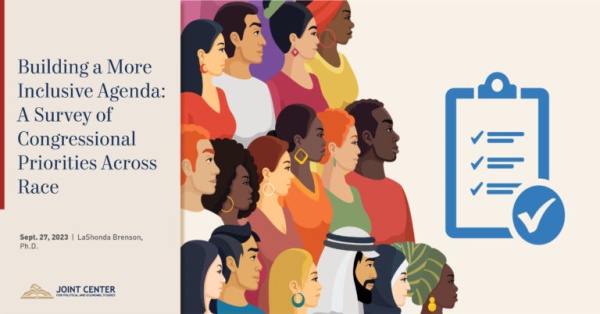(BPRW) Joint Center Releases Series of Survey Results on Congressional Priorities
Black think tank hopes results will provide guidance to policymakers
(Black PR Wire) WASHINGTON — The Joint Center for Political and Economic Studies today released the first in a series of survey results — “Building a More Inclusive Agenda: A Survey of Congressional Priorities Across Race” — that tracks what Americans say Congress should prioritize.
As part of its Data for Black America Project, the Joint Center partnered with NORC at the University of Chicago to survey more than 1,200 Americans across race and ethnicity to understand the importance of priorities for members of Congress. Americans were surveyed on policies related to racial equity, jobs and skills training, tax policy, and regulating technology. The Joint Center will be releasing topical survey results over the next several weeks.
With the 118th Congress being the most diverse in history — about 25 percent identify as people of color — the governing body has the power to produce more inclusive legislation that better represents the 41 percent of the American population who identify as people of color. As Congress works on several priorities through the end of the year, most immediately passing a federal budget to avert a government shutdown, the Joint Center is releasing the survey results to inform members of what Americans say they should be prioritizing.
“Members of this increasingly diverse Congress must work together to enact more inclusive policies to benefit Americans across race and ethnicity. Given the various important policy priorities before this Congress, we wanted to hear what Americans across differing races and ethnicities believe should be top priorities for members of Congress. The survey results should be a guiding light for Congress to shift its priorities to what the American people need,” said Jessica Fulton, interim president and VP, Policy for the Joint Center.
Dr. LaShonda Brenson, senior researcher at the Joint Center, who leads the think tank’s Hill Diversity work, said “Through our series of survey results, Congress can see what the American public wants them to prioritize. The results are a call to action — a fundamental principle of democratic governance for Congress to represent the interests and voices of their constituents.”
Respondents were asked to evaluate several issue areas in terms of their level of importance, categorizing them as a top priority, an important but lower priority, not too important a priority, or something that should not be done. Topline results include:
Over half (52 percent) of all respondents felt that ensuring every American has the right to vote should be a top priority for members of Congress, making it the top priority of all policy issues surveyed.
Black respondents (58 percent) are more likely than white respondents (53 percent), Asian-Pacific Islander, multiracial, other non-Hispanic respondents (50 percent), and Hispanic respondents (44 percent) to believe that every American has the right to vote should be a top priority for members of Congress.
Nearly half (49 percent) ranked increasing the federal minimum wage of $7.25 an hour and ensuring that employers pay wages that keep up with the cost of necessities as a top priority.
Black respondents (62 percent) are significantly more likely than Asian-Pacific Islander, multiracial, other non-Hispanic respondents (52 percent), and white and Hispanic respondents (both 47 percent) to believe that increasing the federal minimum wage of $7.25 an hour and ensuring that employers pay wages that keep up with the cost of necessities as a top priority.
Forty-eight percent of respondents ranked reducing the federal deficit as a top priority.
White respondents (51 percent) are more likely than Black respondents (46 percent), Asian-Pacific Islander, multiracial, other non-Hispanic respondents (45 percent), and Hispanic respondents (37 percent) to rank reducing the federal deficit as a top priority.
Only 15 percent of respondents say that passing legislation to take away funding from the IRS should be a top priority.
Black respondents (21 percent) are more likely than Asian-Pacific Islander, multiracial, other non-Hispanic respondents (18 percent), white respondents (15 percent), and Hispanic respondents (13 percent) to say that passing legislation to take away funding from the IRS should be a top priority.
Fifteen percent of respondents say that regulating companies’ use of technology to make decisions about job interviews and loans should be a top priority.
Black respondents (28 percent) are more likely than Asian-Pacific Islander, multiracial, other non-Hispanic respondents (22 percent), Hispanic respondents (17 percent), and white respondents (12 percent) to say that regulating companies’ use of technology to make decisions about job interviews and loans should be a top priority.
Data from more than 1,200 Americans was collected online between Jan. 26-30, 2023 using NORC’s probability-based AmeriSpeak panel. The Data for Black America Project aims to inform decision-makers about the challenges Black Americans face and provide scholars with valuable data to use in the future. This initiative will periodically field surveys and conduct focus groups on various economic and political issues of particular relevance to Black communities.
To read the full analysis, click here.
###
About the Joint Center for Political and Economic Studies
The Joint Center for Political and Economic Studies, America’s Black think tank, provides compelling and actionable policy solutions to eradicate persistent and evolving barriers to the full freedom of Black people in America. We are the trusted forum for leading experts and scholars to participate in major public policy debates and promote ideas that advance Black communities. We use evidence-based research, analysis, convenings, and strategic communications to support Black communities and a network of allies.
The content and opinions expressed within this press release are those of the author(s) and/or represented companies, and are not necessarily shared by Black PR Wire. The author(s) and/or represented companies are solely responsible for the facts and the accuracy of the content of this Press release. Black PR Wire reserves the right to reject a press release if, in the view of Black PR Wire, the content of the release is unsuitable for distribution.



